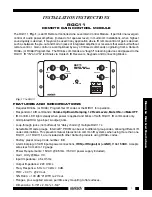
8.4 Monitoring the input terminals for limit violations
The controller provides the option to apply limits (in % of measuring range) to two selected in-
puts (temperature sensor or analog inputs) and to issue an alert to a higher-level control system
by writing in the error status register. Directly after setting the function block, select the terminal
that is to be monitored and the condition that triggers the alarm according to the following
codes:
4
Alarm when upper limit is exceeded (OGW)
Lower limit: 0 %
Upper limit: Any
4
Alarm when bottom limit is not reached (UGW)
Lower limit: Any
Upper limit: 100 %
4
Alarm when the limits is exceeded or not reached
Lower limit: > 0 % < OGW
Upper limit: > UGW < 100 %
4
Alarm ON, when UGW is exceeded and alarm OFF when OGW is not reached
Lower limit: > OGW < 100 %
Upper limit: > 0 % < UGW
Input to which temperature sensors are connected have readings in °C (measuring range from
–30 to 160 °C); analog input readings are shown in % of the measuring range.
In systems Anl 1, 3, 4, 6, 7 and 10, the limit alarm is made with “BA EIN“ over an analog relay.
A make contact or break contact function can be assigned to the relay by selecting “STEIG“ (=
rising signal edge) and “FALL“ (= negative signal edge) respectively. The limit alarm also ap-
pears in the error status register by selecting “Fsr-E”.
Note!
The associated binary output is marked in the wiring plan with GWx and GWy and depends on
the system code number (Anl).
Function
WE
Configuration
Limit monitoring at terminal
x, y
Co5 -> Fb11, 12 = ON
Terminal number
Upper/lower limit
Signal edge, binary output
FSr-A/FSr-E: Status alarm to error status register ON/OFF
BA EIN/BA AUS: Setting/not setting the binary input
FALL/steig: Negative signal edge/increasing signal edge
EB 5179 EN
71
Operational faults
















































